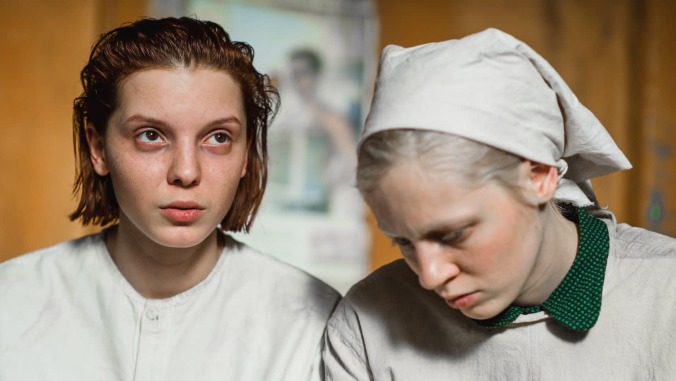A twisted friendship blossoms in the rubble of war in the Cannes award winner Beanpole


In a hospital where few patients are ever healed, overseen by a doctor who only delivers bad news, a woman is having a seizure. Her guttural choking can be heard on the soundtrack before Beanpole fades in on its opening moments, her mouth gurgling and her limbs twitching as she stands frozen in a steaming, bustling laundry room. This is a time and place where such misery is routine: Iya (Viktoria Miroshnichenko), a.k.a. Beanpole, is a nurse in a veterans’ hospital in Leningrad, 1945. She was “invalided out” from the Red Army the year before with a diagnosis of post-concussion syndrome—a condition we’d now refer to as PTSD. But while this lanky, freshly scrubbed young woman’s physical struggles are obvious, she keeps her psychological pain to herself.
That’s because Iya isn’t the only one who’s suffering. The former soldiers on Iya’s ward have all sustained severe, life-altering injuries; one of them, an ex-sniper named Stepan (Konstantin Balakirev), is paralyzed from the neck down and begs for death—a request that head physician Dr. Nikolay Ivanovich (Andrey Bykov) can’t officially fulfill. He can send a tall, thin angel of mercy to terminal patients’ bedsides at night, however, a secret euthanasia program that cements the paternal bond between him and Iya. He even gives her extra ration cards to feed Pashka (Timofey Glazkov), the boy he thinks is Iya’s young son. Reserved as always, Iya doesn’t bother to correct him, but Pashka is not actually Iya’s child; he’s the son of Masha (Vasilisa Perelygina), an old friend from her Army days who sent the infant back to Leningrad with Iya for safekeeping. But even this act of kindness is marred by tragedy, as director Kantemir Balagov lays out in a sequence early in the film that shifts from playful to horrifying over the course of a few shocking seconds.
It’s not until Masha shows up at Iya’s door a few scenes later that Beanpole reveals the twisted dynamics that will drive its story, a fitting choice for a film whose characters are muzzled by repression. Miroshnichenko plays the near-silent Iya with hunched shoulders and a cowed head, an adaptation that the character may have originally taken on because of her size—she stands head and shoulders over everyone else in the film—but could only have been enhanced by the horrors of the Eastern Front. Perelygina, meanwhile, freezes a cynical smirk on Masha’s face, only occasionally revealing flashes of the anger and sadness behind her impulsive actions. Her emotional wall comes down for a few moments in a scene where Masha twirls around in a new dress created by her seamstress neighbor, a facsimile of happiness that quickly spirals into a crazed outpouring of grief. The rest is cruel calculation—especially toward Iya, who doesn’t share Masha’s ability to hide her emotions and whose attraction to Masha is clearly more than platonic.
Balagov spins these individual pathologies into a diagnosis of the psychological effects of WWII on Russia in general, conveying the collective horror of a nation forced to do terrible things to survive through the story of two friends asking the impossible of each other. The film’s bleak finale underlines this larger political point, but smartly does so in the service of character development rather than pure pedagogy. In fact, Beanpole keeps its set pieces muted and interpersonal throughout, revealing the sadomasochistic underpinnings of Iya and Masha’s friendship through dialogue filmed in intimate close-up. Laden with the weight of everything said and unsaid that’s passed between these characters, Masha gently stroking Iya’s hair lands like a punch in the face.
In Beanpole, mangled bodies and piles of rubble fuse together in a tableau of devastation, a chilly morning-after Guernica where the blood has frozen to the sidewalk. There’s a tattered grandeur in the worn-down architecture of the city formerly known as St. Petersburg, as well as an odd beauty in the emaciated frames and contorted limbs of the patients in Iya’s care. Balagov, who won the Un Certain Regard Best Director Award at this year’s Cannes, shoots these damaged people and places with a painterly eye, utilizing jaundiced yellow and flushed red lighting; combined with the thoughtful framing, it lends the film’s subjects a quiet dignity—even (or perhaps especially) when their actions are disturbing. But even thought it’s a bleak and uncompromising film, it’d be unfair to call Beanpole “misery porn.” The questions it’s asking are much more complicated, and more cutting, than that.